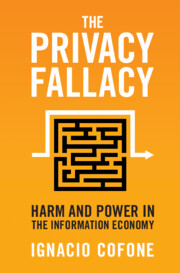Book contents
- The Privacy Fallacy
- The Privacy Fallacy
- Copyright page
- Dedication
- Contents
- Acknowledgments
- Abbreviations
- Introduction
- 1 The Traditionalist Approach to Privacy
- 2 Privacy Myths
- 3 The Consent Illusion
- 4 Manipulation by Design
- 5 Traditionalist Data Protection Rules
- 6 Pervasive Data Harms
- 7 Privacy as Corporate Accountability
- Conclusion
- Notes
- Index
Introduction
Published online by Cambridge University Press: 16 November 2023
- The Privacy Fallacy
- The Privacy Fallacy
- Copyright page
- Dedication
- Contents
- Acknowledgments
- Abbreviations
- Introduction
- 1 The Traditionalist Approach to Privacy
- 2 Privacy Myths
- 3 The Consent Illusion
- 4 Manipulation by Design
- 5 Traditionalist Data Protection Rules
- 6 Pervasive Data Harms
- 7 Privacy as Corporate Accountability
- Conclusion
- Notes
- Index
Summary
Tech companies bypass privacy laws daily, creating harm for profit. The information economy is plagued with hidden harms to people’s privacy, equality, finances, reputation, mental wellbeing, and even to democracy, produced by data breaches and data-fed business models. This book explores why this happens and proposes what to do about it. Legislators, policymakers, and judges are trapped into ineffective approaches to tackle digital harms because they work with tools unfit to deal with the unique challenges of data ecosystems that leverage AI. People are powerless towards inferences about them that they can’t anticipate, interfaces that manipulate them, and digital harms they can’t escape. Adopting a cross-jurisdictional scope, this book describes how laws and regulators can and should respond to these pervasive and expanding harms. In a world where data is everywhere, one of society’s most pressing challenges is addressing power discrepancies between the companies that profit from personal data and the people whose data produces profit. Doing so requires creating accountability for the consequences of corporate data practices—not the practices themselves. Laws can achieve this by creating a new type of liability that recognizes the social value of privacy, uncovering dynamics between individual and collective digital harms.
Keywords
- Type
- Chapter
- Information
- The Privacy FallacyHarm and Power in the Information Economy, pp. 1 - 10Publisher: Cambridge University PressPrint publication year: 2023

